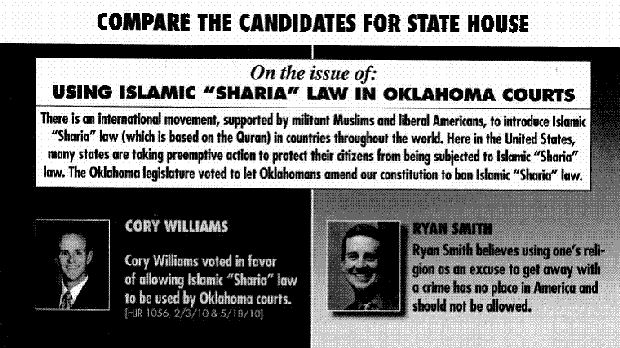Sharia law: an election issue in Oklahoma
At the recent US midterms voters in Oklahoma were given the choice to ban Sharia law from being considered in courts. Sarah Smith asks why it was a controversial question.
Oklahoma, where the winds come sweeping down the plain, is a dangerous place to visit if you are prone to getting show tunes stuck in your head.
Even driving a rented Chevy Suburban we were all singing about a “surrey with a fringe on top”. And the road signs don’t help. Directions for Tulsa immediately get you humming Gene Pitney – even though we were more like two hours away not 24. When you see the highway turn off for Amarillo who wouldn’t immediately burst into a Peter Kay impersonation “is this way to Amarillo”
But it is a very different tune that has people worried in Oklahoma. Politicians have been trying to frighten their constituents into thinking here is an imminent threat from Islam that before long the adhaan, the Muslim call to prayer, will be ringing out across their state.

At the recent midterm elections voters in Oklahoma were given the choice on the ballot in state question 755 – to vote to ban Sharia law from being considered in Oklahoma courts. It is probably not surprising that 70 per cent of them voted for this ban – especially when you see the scaremongering election literature that was devoted to this issue.
Any Democrat who argued against this unnecessary ban was immediately targeted and accused of actively wanting to introduce Sharia law to the state of Oklahoma. Suddenly voters were being told that Muslim terrorists could be tried in Oklahoma courts under Islamic Law and, presumably, then set free.
No one I spoke to in Oklahoma (including those who drafted the amendment) could point to any kind of threat that Sharia law was about to be introduced into their legal system, so it is tempting to conclude the whole exercise was simply a way to frighten Republican voters out of their houses and into the polling booths by inventing a dangerous but fictitious threat.
It is a dirty political tactic that worked – Democrats lost eight seats in the state legislature and the Republicans went on to win their best election results in Oklahoma’s history.
If no one wanted to introduce Sharia law anyway then who suffers if it is banned by statue? An interesting question I posed to several of the Muslim activists who are mounting a legal challenge against this state proposition. They are upset that Islam has been singled out for a specific exclusion and they argue this violates the constitution’s first amendment which prohibits any established religion. If you cannot favour one particular religion then you can’t discriminate against one either. And it is perfectly possible the separation of church and state is being violated by this law as well. The legal challenges are likely to go all the way to the US Supreme Court and could take years.
In the meantime, does it have any practical effect to ban something that never existed? Worryingly this law is already producing some unforeseen consequences. I met one young man coming out of Friday prayers who told me that his wife was now in trouble for wearing a headscarf to work. As soon as state question 755 was passed her boss called her in and told her that if she intended to keep her head covered HR would have to investigate whether or not it was legal for her to carry on working there. They haven’t decided yet.